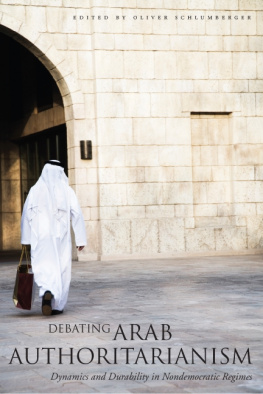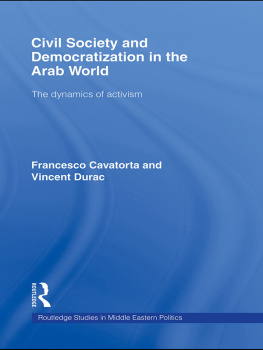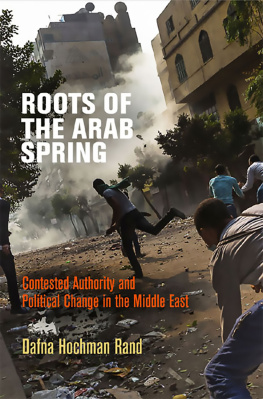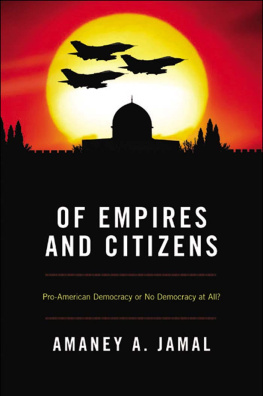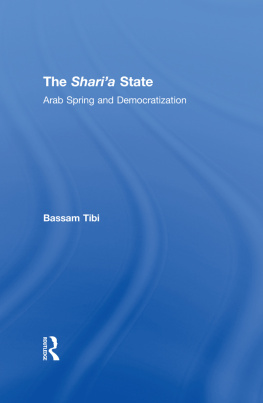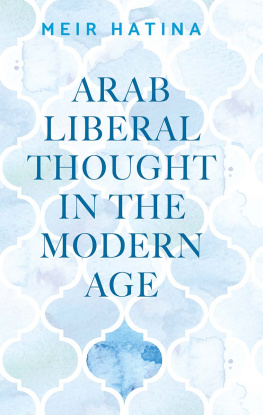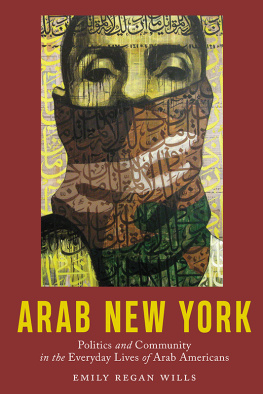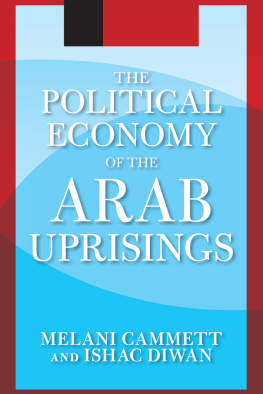Debating Arab Authoritarianism
Dynamics and Durability in Nondemocratic Regimes
Oliver Schlumberger
Stanford University Press
Stanford, California
2007 by the Board of Trustees of the Leland Stanford Junior University.
All rights reserved.
No part of this book may be reproduced or transmitted in any form or by any means, electronic or mechanical, including photocopying and recording, or in any information storage or retrieval system without the prior written permission of Stanford University Press.
Printed in the United States of America on acid-free, archival-quality paper
Library of Congress Cataloging-in-Publication Data
Debating Arab authoritarianism : dynamics and durability in nondemocratic regimes /
edited by Oliver Schlumberger.
p. cm.
Includes bibliographical references and index.
9780804779616
1. Arab countries--Politics and government--21st century. 2. Middle East--Politics and government--21st century. 3. Authoritarianism--Arab countries. 4. Authoritarianism--Middle East. 5. Democratization--Arab countries. 6. Democratization--Middle East. I. Schlumberger, Oliver.
JQ1850.A58D436 2007
321.909174927--dc22
2007029731
Typeset by Bruce Lundquist in 10/14 Minion
To Rose and Jonas
ACKNOWLEDGMENTS
THE IMPETUS FOR THIS BOOK came from a workshop I codirected with Farid El-Khazen of the American University in Beirut at the fifth Mediterranean Social and Political Research Meeting, organized by the Robert Schuman Center for Advanced Studies of the European University Institute (EUI), in Montecatini Terme, Italy, in March 2004. This conference gave us the opportunity to gather Arab, American, and European scholars for a workshop to discuss the dynamics within and the durability of Arab authoritarianism. The EUIs and Imco Brouwers personal support of the project, through sponsoring that workshop but also in its aftermath, is gratefully acknowledged. Initially the volume was to be coedited by the workshop directors, but Farid had other obligations that prevented him from participating further. Yet I am glad that through his efforts and work during the review process of more than 60 paper proposals for the workshop and through his ideas, he significantly influenced this volume.
After I had left Tbingen University in 2004, Dirk Messner of the German Development Institute (DIE) in Bonn made it possible for me to continue to work on the book at that institute. The DIE also readily funded language and style editing. I am grateful to Deborah Ann Rice for improving our (nonnative speakers) English with diligence. Moreover, the organization of the manuscript, the revisions of individual chapters, and the compilation of the bibliography would have been impossible without the assistance of Nathalie Bouchez, Stephanie Portoff, Jennifer Mansey, Maria Josua, and Kevin Khler.
Several authors had to update or rewrite their contributions because unforeseen circumstances prolonged the process more than anticipated, including health reasons that kept me away from work for almost half a year. The contributors constant encouragement and readiness to help and stay onboard is exceptional. I am grateful to this fine team of authors, who, despite all obstacles, still valued the book as their preferred outlet and upon whose patience I depended. Many of them not only wrote their own chapters but felt personally responsible for the outcome as a whole and generously lent their help, encouragement, and advice in many instances. Most of all, I am indebted to Holger Albrecht, who not only discussed and accompanied the project with me from the first ideas in 2002 to June 2006 but also helped several authors revise their chapters, rereview them, and discuss them. Apart from Stanford University Press and myself, Holger has the greatest share in the realization of this book. Roger Owen accompanied the project with constructive criticism up to the final stages of the manuscript, and Kate Wahl, Kirsten Oster, and Carolyn Brown of Stanford University Press were always there when help was needed during these stages and during production so that collaboration was a pleasure. Last but not least, I would not have had the energy for this project without the continuous support provided by Anni and by my parents, to whom I dedicate this book.
O. S.
January 2007
CONTRIBUTORS
Paul Aarts is senior lecturer in international relations at the Department of Political Science, University of Amsterdam, the Netherlands. He has published widely on Middle Eastern politics and economics. Among his recent publications is Saudi Arabia in the Balance: Political Economy, Society, Foreign Affairs (London and New York: Hurst and New York University Press, 2005/2006), coedited with Gerd Nonneman.
Holger Albrecht is assistant professor at the Institute for Political Science of the University of Tbingen, Germany. He has published articles on authoritarian regime change, political participation and opposition, civil society, and Islamist movements in the Middle East and North Africa in a number of journals and edited volumes.
Philippe Droz-Vincent is assistant professor of political science and teaches at the Institut dtudes Politiques in Paris. He is the author of The American Moment in the Middle East (Paris: La Dcouverte, 2007 [in French]) and The Middle East: Authoritarian Power, Blocked Societies (Paris: Presses Universitaires de France, 2004 [in French]) as well as Quel avenir pour lautoritarisme arabe? [What Future for Arab Authoritarianism ?], Revue Franaise de Science Politique , 54 (6), 945979 (2004).
Steven Heydemann is associate vice president of the U.S. Institute of Peace in Washington, DC, and, from 20032007, directed the Center for Democracy and Civil Society at Georgetown University. He is the author of Authoritarianism in Syria (Ithaca, NY: Cornell University Press, 1999) and the editor of War, Institutions, and Social Change in the Middle East (Berkeley: University of California Press, 2000) and of Networks of Privilege in the Middle East: The Politics of Economic Reform Reconsidered (New York: Palgrave, 2004). He is currently working on a book about the persistence of authoritarianism in the Middle East.
Eberhard Kienle is the author of Bath v. Bath: The Conflict Between Syria and Iraq, 19681989 (London: I. B. Tauris, 1990) and A Grand Delusion: Democracy and Economic Reform in Egypt (London: I. B. Tauris, 2001) as well as the editor of several books. Professor Kienle is currently director of the Institut de Recherche et dtudes sur le Monde Arabe et Musulman (IREMAM/CNRS) in Aix-en-Provence, France.
Fred H. Lawson is Rice Professor of Government at Mills College. He is author of Constructing International Relations in the Arab World (Stanford, CA: Stanford University Press, 2006) and Why Syria Goes to War (Ithaca, NY: Cornell University Press, 1996), among other studies of political economy and foreign policy in the contemporary Middle East.
Giacomo Luciani is the director of the Gulf Research Center office in Geneva and professorial lecturer in Middle Eastern studies at the Johns Hopkins University Bologna Centre. His research interests include political economy of the Middle East and North Africa and geopolitics of energy. His name is primarily associated with work on the rentier state in the Arab world. He has edited The Rentier State (New York: Croom Helm, 1987) with Hazem Beblawi; The Politics of Arab Integration (New York: Croom Helm, 1988) with Ghassan Salam; and The Arab State (Berkeley: University of California Press, 1990). In recent years Professor Luciani has continued to work on the concept and impact of the rentier state, in particular with respect to democratization in the Arab world.

